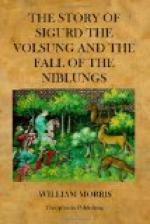She said: “I am
nought but a woman, a maid of the earl-folk’s
kin:
And I went by the skirts of
the woodland to the house of my sister
to win,
And have strayed from the
way benighted: and I fear the wolves and
the wild
By the glimmering of thy torchlight
from afar was I beguiled.
Ah, slay me not on thy threshold,
nor send me back again
Through the rattling waves
of thy ford, that I crossed in terror and
pain;
Drive me not to the night
and the darkness, for the wolves of the
wood to devour.
I am weak and thou art mighty:
I will go at the dawning hour.”
So Sigmund looked in her face
and saw that she was fair;
And he said: “Nay,
nought will I harm thee, and thou mayst harbour
here,
God wot if thou fear’st
not me, I have nought to fear thy face:
Though this house be the terror
of men-folk, thou shalt find it as
safe a place
As though I were nought but
thy brother; and then mayst thou tell,
if thou wilt,
Where dwelleth the dread of
the woodland, the bearer of many a guilt,
Though meseems for so goodly
a woman it were all too ill a deed
In reward for the wood-wight’s
guesting to betray him in his need.”
So he took the hand of the
woman and straightway led her in
Where days agone the Dwarf-kind
would their deeds of smithying win:
And he kindled the half-slaked
embers, and gave her of his cheer
Amid the gold and the silver,
and the fight-won raiment dear;
And soft was her voice, and
she sung him sweet tales of yore agone,
Till all his heart was softened;
and the man was all alone,
And in many wise she wooed
him; so they parted not that night,
Nor slept till the morrow
morning, when the woods were waxen bright:
And high above the tree-boughs
shone the sister of the moon,
And hushed were the water-ouzels
with the coming of the noon
When she stepped from the
bed of Sigmund, and left the Dwarf’s abode;
And turned to the dwellings
of men, and the ways where the earl-folk
rode.
But next morn from the house
of the Goth-king the witch-wife went
her ways
With gold and goods and silver,
such store as a queen might praise.
But no long while with Sigmund
dwelt remembrance of that night;
Amid his kingly longings and his many deeds of
might
It fled like the dove in the forest or the down
upon the blast:
Yet heavy and sad were the years, that even in
suchwise passed,
As here it is written aforetime.
Thence were ten
years worn by
When unto that hidden river a man-child drew anigh,
And he looked and beheld how Sigmund wrought on
a helm of gold
By the crag and the stony dwelling where the Dwarf-kin
wrought of old.
Then the boy cried: “Thou art the wood-wight
of whom my mother spake;




